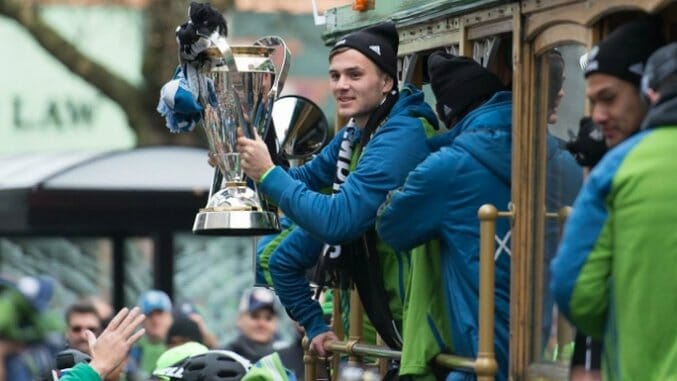Going The Long Way Around: Jordan Morris On MLS Cup, USMNT, And Living With Diabetes

Lots of people will tell you that 2016 was an eventful year for them, but when Jordan Morris says it, he means it. The 22-year-old started the year with a tryout at Werder Bremen, a move he seriously considered before ultimately signing his first professional contract with his hometown Seattle Sounders. All the hard work he put in since making the team at Mercer Island High School had finally paid off, and the reward was more hard work and more responsibility. Not that Morris ever backs down from a challenge— after all, you can’t build yourself up into one of Major League Soccer’s most promising young forwards while managing Type 1 Diabetes without an ambitious streak and a strong work ethic. He was instrumental in pulling the Sounders up from the foot of the Western Conference into a playoff spot, and then defy the odds to lift the MLS Cup last weekend. Along the way he’s pushed for as many minutes as he can get with the USMNT, eyeing up an opportunity to help push that stalled car up the hill and into the 2018 World Cup.
So, yeah. 2016. Bit of a year.
We got to talk to Morris last week about his incredible first season with the Sounders, developing his game while managing Diabetes, and what it means to play in front of the hometown crowd.
Paste: First of all, congratulations. You’re a newly minted MLS Cup Champion, you just came off the victory rally in Seattle. How does it feel?
Jordan Morris: Yeah, it’s amazing. Personally after that rally, seeing how many people came out to support us and just that they’ve been behind us all season. We’re happy we could bring a championship back to our fans. Definitely a dream come true.
Paste: You grew up in Seattle. The Sounders are sort of your hometown team, and I know playing for them and winning a championship must have been really special. I’m sure winning a championship. Walk me through how it felt to bring the Sounders’ first MLS Cup home and be in front of your people.
Morris: It’s hard to put into words, because I was a big fan obviously when I was younger. Being able to play in front of my friends and my family is a gift. I know exactly where my parents sit during the game and I wave to them before every game. It’s just a really special experience to be able to play in front of my hometown fans and my friends. That’s just been amazing. Like I said, Seattle is such a great city for sports, and to be able to be a part of that legacy and be a part of that tradition and just reaffirm that Seattle is a championship caliber city is awesome.
Paste: You’ve had a crazy year. You started with a tryout at Werder Bremen in the Bundesliga, and you decided not to go that route. You signed your first professional contract with the Sounders. You started with them at the beginning of the season. You went through the lowest points of the year with them. At one point you were near the bottom of the Western Conference, and now you are being paraded around as a champion in front of your own fans. How did you cope?
Morris: It was crazy and there were a lot of ups and downs, but if you can kind of ride the wave rather than getting too high about the ups or too low about the lows, just staying neutral, as best you can staying in the middle. Because I definitely got too low sometimes about the low and it really affected how I played, especially at the beginning of the year. Trying to figure out how to find that balance in your life, I felt, was really important.
Paste: When things were really low (and then also when things were really high), who at the club did you look to for guidance, for stability, for any kind of reprieve from the pressure? Who were the leaders in that dressing room over the summer when things were really bad? Who did you look to for support?
Morris: My teammates have been super helpful. All of the veterans know that that’s part of the life of an athlete is that there’s going to be ups and downs. So guys like Brad Evans, Nelson Valdez, Clint, Chad Marshall. Guys like that who have been through it and understand the difficulties of playing a season in professional soccer. Those guys have been great just giving me advice and helping me through the tough times. And obviously I have a good friend in Christian Roldan on the team, so we’re able to talk to each other when things are tough and can kind of help each other out with that. And then obviously I still live at home. I think outside the club, my family has been great with helping me out when times are difficult. Just being surrounded by them is awesome.
-

-

-

-

-

-

-

-

-

-

-

-

-

-

-

-

-

-

-

-

-

-

-

-

-

-

-

-

-

-

-

-

-

-

-

-

-

-

-

-








































